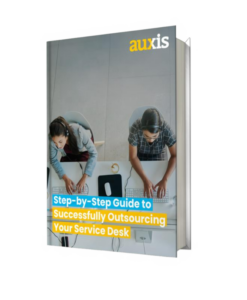Outsourcing your help desk is a no-brainer today – providing an easy, cost-effective solution for modernizing technical support and freeing IT staff to focus on strategic priorities. But choosing the outsourcing model that works best for your business isn’t a snap decision, with shared and dedicated teams offering different and important benefits, and it’s critical to examine both to conclude which one works best for your business.
Help desks rank among the most popular outsourced IT services, with 68% of organizations turning to third-party providers for technical support, according to Deloitte’s 2022 Global Outsourcing Survey.
It’s easy to see why. Eschewing the firefighting approach that typically characterizes in-house support for a proactive, high-performance service desk ensures smooth operation of core business services. Another key benefit, especially given the current climate of economic uncertainty, is that help desk outsourcing can also optimize operating costs through labor arbitrage, automation, process efficiencies, and metrics that drive continuous improvement.
The ongoing IT labor shortage is also leaving IT departments stretched too thin to accommodate the surging number of help desk requests from an increasingly remote workforce. IT staff overwhelmed with support issues cannot be expected to have time for innovation that drives growth and insulates your business from future disruptions.
However, building a help desk solution that addresses the unique needs of your organization is essential for success. Let’s review the differences between dedicated and shared services help desk resources to help you unlock maximum benefits for your business.
The benefits of a dedicated resource model
As the name implies, dedicated resources, or managed teams, are dedicated solely to your business. This help desk model typically works best for larger organizations that require more specialized skills, knowledge, or training to support users.
For instance, a foodservice chain that needs help desk support for a specific point-of-sale system requires dedicated resources.
- Greater customization: Dedicated resources truly extend your in-house team, following your documented processes and technologies. Clients define the service catalog, can train resources on systems specific to your business, and can even co-manage teams.
- In-depth knowledge of your organization: The best providers enforce robust metrics to ensure resources in both help desk models meet high quality standards. But with undivided attention, dedicated teams gain acute knowledge of your company culture, procedures, and systems that can make issue resolution easier. This model also creates consistency as end-users encounter the same agents.
- More specialized resources: Since dedicated agents are trained in your specific systems, they can support more complex technology and procedures.
- Enhanced security: Unlike shared teams who support multiple clients, dedicated agents can only access your systems. You can even require them to use company computers to perform work. While shared teams also follow robust security measures, dedicated models can maximize protection for organizations concerned about access to sensitive information or stringent regulatory requirements.
- Continuous improvement opportunities: While dedicated teams utilize your systems and processes, exceptional providers also offer opportunities to optimize your help desk by taking advantage of their expertise, tools, and technologies. For instance, they can recommend process improvements, develop training materials, create quality standards, improve visibility by implementing best-in-class reporting tools, boost performance and quality through automation, and more.

The advantages of a shared services help desk resource model
Shared resources, or managed services, are ideal for standardized help desk solutions, enabling organizations to leverage economies of scale by sharing agents performing similar work. Help desk staff maintain general knowledge about end-user support; for instance, providing expertise in commonly used Microsoft products, hardware, and software.
- Potential for lower costs. While dedicated resource models usually charge a flat rate per help desk agent, pricing for shared models is typically transaction based. That can drive lower costs for companies with lower ticket volumes because you only pay for what you use. Sharing resources also allows providers to spread help desk costs across multiple clients; for instance, increasing affordability and efficiency for global organizations that require support across different shifts and languages.
- Instant access to optimized help desk services. With deep experience providing help desk services to a wealth of clients, shared teams from quality outsourcers operate with best practices and the latest technologies to deliver high-performance service desk support. New clients can instantly benefit from skilled talent and innovations like automation, market-leading reporting tools, and flexible channels for contacting the help desk without a pricey upfront investment in new technology.
- Ensure timely and consistent service with best-in-class SOPs. Many IT departments lack the time and expertise to document best-in-class standard operating procedures (SOPs) for their help desks. Shared teams have proven, standardized SOPs in place that can be tweaked to best meet the needs of different customers. For instance, exceptional providers will collaborate with clients to improve and incorporate your existing processes into their help desk service.
- Less impact from turnover. Shared teams minimize attrition risk. Since there is no specialized training, it’s easier to get new help desk staff up to speed or utilize agents who already support other clients.
Selecting the model that’s right for you
Now that you understand the differences, how do you determine which model works best for your business? Consider these important factors:
- Does your organization generate enough volume to support a dedicated model?
- Do you have complex, uncommon, or customized systems that require end-user support?
- Does your budget support the costs of a very customized service, or do you want the leverage provided by shared teams?
- Does your IT department have mature help desk processes, metrics, and tools in place, or do you need access to optimized services from your provider?
Option 3: Customizing a hybrid help desk with an exceptional partner
In some cases, companies require aspects of both models to achieve the greatest benefit. Exceptional outsourcers prioritize flexibility, customizing hybrid solutions that provide the best of both worlds to your organization.
For example, they could establish a support desk that offers dedicated assistance during a critical period and implement a more cost-efficient shared solution during other times. Semi-dedicated support teams can also be structured to handle fewer accounts – combining the more detailed knowledge of dedicated agents with access to the tools, best practices, and economies of scale delivered by shared teams.
Across every solution, your outsourcer should ensure the best results with additional support roles focused on training, quality assurance, workforce management, knowledge management, and customer satisfaction. The best help desk providers also offer opportunities to grow your outsourcing footprint with additional services like desktop support, networking, engineering, and NOC (Network Operations Center).
Choosing a dedicated or shared team for your help desk involves considering many important factors, and there’s no one-size-fits-all solution. A quality partner can help you assess your business needs and implement a model that delivers customer service excellence.
Ready to achieve a high-performance service desk? Schedule a consultation with our IT outsourcing experts today!
2025 Auxis Help Desk Report: A Step-by-Step Guide to Successfully Outsourcing your Service Desk





